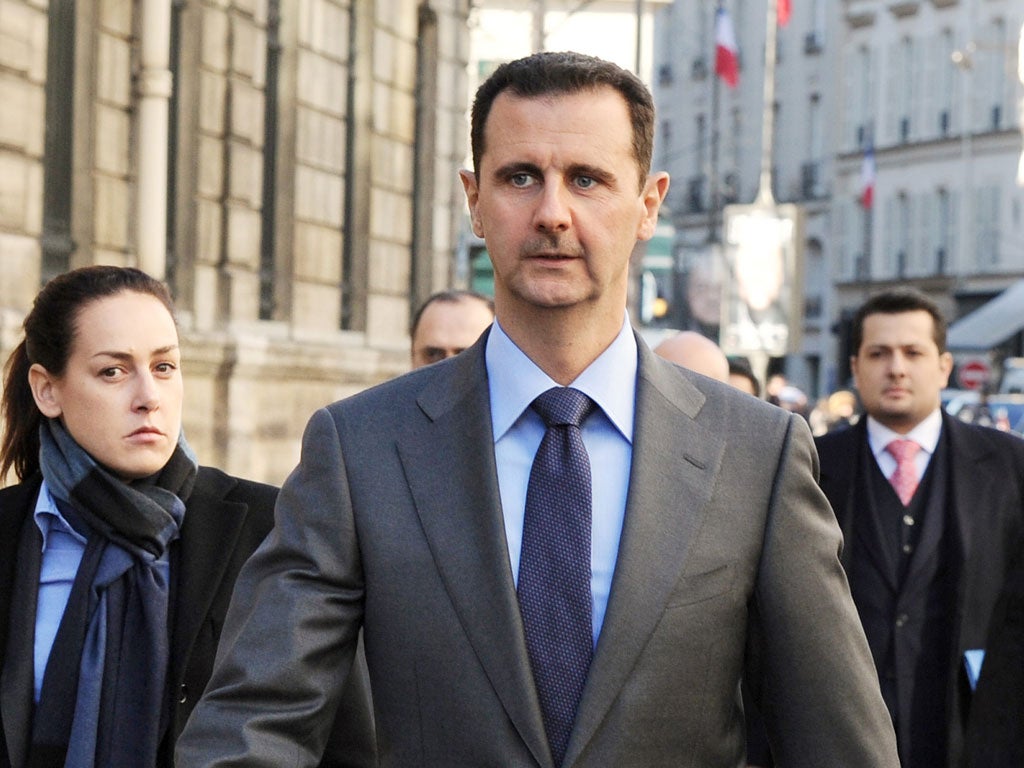'Assad, wake up! We're with Homs to the death!'
Charlotte McDonald-Gibson follows activists in Damascus as they engage in a cat-and-mouse game with the authorities to hold furtive protests

Shoulders hunched and their gaze fixed ahead as they hurry through the winding streets, the men of this western Damascus suburb move quickly and quietly as they head to Friday prayers.
Whatever revolutionary fervour is in their hearts, they hide it well. Slowly, the streets clear as women and children hurry inside. Shutters are pulled down on the shops. The silence is broken only by the chants of the imam.
The first sign that this is one of the dozens of furtive Damascus protests against the dictatorial rule of President Bashar al-Assad comes when the prayers finish, and the cries of "Allahu Akbar" – "God is the greatest" – ring out from the exit of the Farouk Mosque.
Moments later, the voices get louder and a handful of young men, their faces covered with red-and-white keffiyeh scarves, run ecstatically into the small square and fling hundreds of white and pink flyers high in the air. They fall like confetti on the street, telling all who pick them up: "Assad wake up, your time is up".
At mosques across Damascus yesterday, thousands of people gathered for similar rallies. Their numbers were swelled by outrage at the events of the past week, as President Assad's forces unleashed a barrage of rockets and mortars on opposition neighbourhoods in the city of Homs.
"Homs, we are with you to the death!" the protesters chant. The crowd swells to about 300 people, and the shouting men unfurl the old Syrian flag, now adopted by the rebel movement.
These protests are painstakingly arranged each week, often at the last minute in a complicated game of cat and mouse to evade the police and the feared Shabiha militia. Security checkpoints spring up across the capital every Friday, a futile attempt to stop the rising dissent against a family which has ruled Syria for 41 years.
But it is never long before the security forces sniff out the dissenters. After only eight minutes of chanting, a shout goes out and the protesters scatter. A hard core of young men converge at the next junction, pushing over a rubbish bin to block the road and picking up rocks, ready for a fight.
Then the first burst of gunfire rings out. It is not clear how close it is, and there is another protest at the mosque in the next neighbourhood. But it is enough to scatter the men again, and they melt away into the alleyways.
They are just in time: three taxis stuffed full of armed men barrel down the narrow road. In the open boot of one car sit two men in army fatigues, Kalashnikovs on their laps. Volleys of gunfire crackle in the air, and two city buses packed with dozens of soldiers arrive. The third bus contains fierce-looking young men. They are not in uniform, but one hangs out of the door, a heavy wooden stick at the ready.
By early evening yesterday, up to 50 people were reported injured in clashes with the security forces around the Farouk Mosque and the nearby Mustafa Mosque. Activists say this is a scene played out every Friday across the capital.
There could never be a Tahrir Square in Damascus, they say, referring to the central Cairo square where hundreds of thousands of Egyptians gathered and toppled their hated dictator, Hosni Mubarak. The Syrian army would simply mow them down.
Instead, people try and make their voices heard whenever they can. As midnight comes in many suburbs, men lean out of their windows and shout "Allahu Akbar" into the darkness, a provocative cry to a secularist regime.
Their cries are often answered by the ringing of gunfire. Opposition activists meet in secret to devise new ways to spread their message. Once, they broke into a bus depot at night and stacked leaflets on the top of the vehicles. When the buses pulled out in the morning, the leaflets rained down on the public.
For many people who have grown up terrified of uttering even the name of President Assad or his father, Hafez, just to read a flier calling for his downfall gives astonishing release. One young man explains the euphoria of his first protest, where he heard people vocalising what he had been afraid to say for decades. "I wanted someone to punch me in the face to show me that it was real," he tells The Independent. Of course, there are many who still support the government, especially in Damascus and the second city of Aleppo, where the middle class and business community are desperate for the stability the Assad family was once able to provide. Many members of the President's Allawite religious community also remain loyal.
For the activists, they do not yet know how their "revolution" will end. They know that Egypt has seen bloody outbursts of communal violence, and Libya is grappling to restore law and order.
"People say, 'The one you know is better than the one you don't know'," observes a middle-aged professional. "I think the opposite: you have to try, knowing very well that it might turn out badly, but at least you have tried."
Subscribe to Independent Premium to bookmark this article
Want to bookmark your favourite articles and stories to read or reference later? Start your Independent Premium subscription today.

Join our commenting forum
Join thought-provoking conversations, follow other Independent readers and see their replies